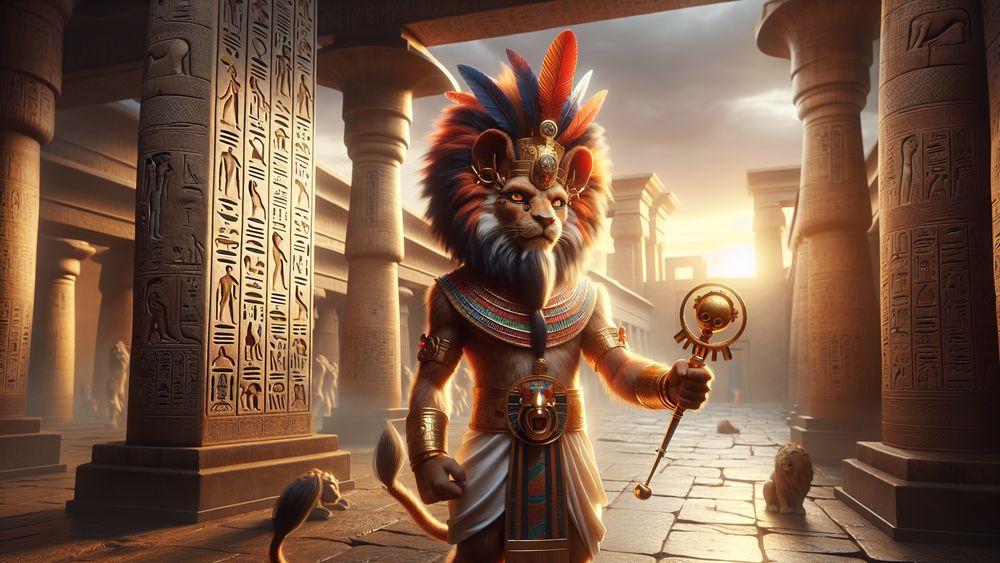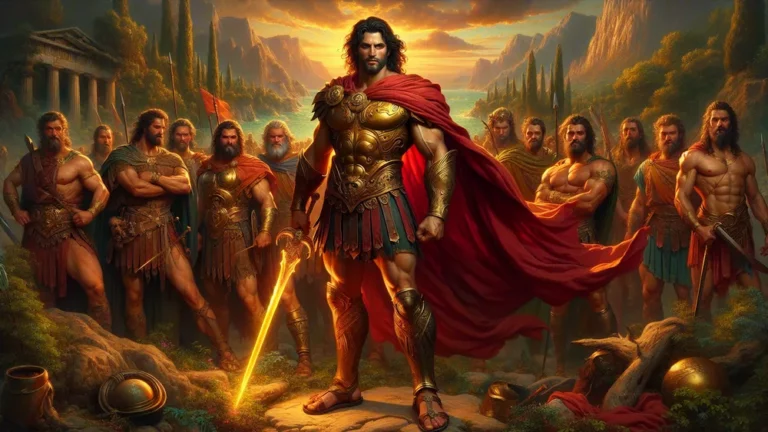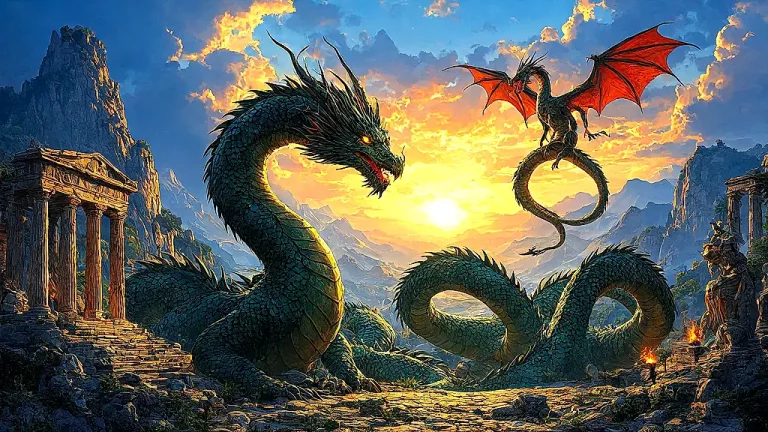Bes: Ancient Egyptian God And Protector Of Families
Bes stands out in the lineup of ancient Egyptian deities. His look and the roles he fills make him unique. While many gods and goddesses from ancient Egypt connect with huge concepts or the forces of nature, Bes focuses on the home and the people living in it. Families, especially mothers and kids, look to him for protection. They believe he can keep evil away and bring luck.
Key Points:
- Bes is an ancient Egyptian deity who focuses on protecting families and homes.
- Bes has a unique appearance with a lion-like face and short stature, which sets him apart from other Egyptian gods.
- Bes is known for safeguard and luck in childbirth and for newborns.
- People in ancient Egypt worshipped and venerated Bes through offerings like food and flowers and by wearing amulets for safety.
- Bes’s influence can be seen in modern culture through art and literature, where his essence and traits are sometimes incorporated.
- Over time, Bes’s perception has shifted from a household protector to a subject of historical and mythological interest.
- Bes’s role as a guardian and protector influenced later religious beliefs and mythologies, especially within Christian and Islamic traditions.
His influence touches nearly every part of daily life, from when a child is born to keeping the family safe, even to making people smile and decorating their bodies. Thus, Bes becomes a constant presence in the culture and religious practices of ancient Egypt.
Who is Bes: The Unique Nature of an Egyptian Deity
To really get why Bes is so different from the other gods in Egypt’s stories, we need to look closely at what makes him stand out. He’s unusual, indeed.
Bes: Not Your Typical God
In the wide and varied world of ancient Egyptian deities, Bes makes for a standout figure. His look and job really break the mold when you stack him up against the more commonly talked-about gods and goddesses. While those others often get to show off in perfect human forms and handle the big-ticket items like the afterlife or the sun, Bes rocks a totally different vibe.
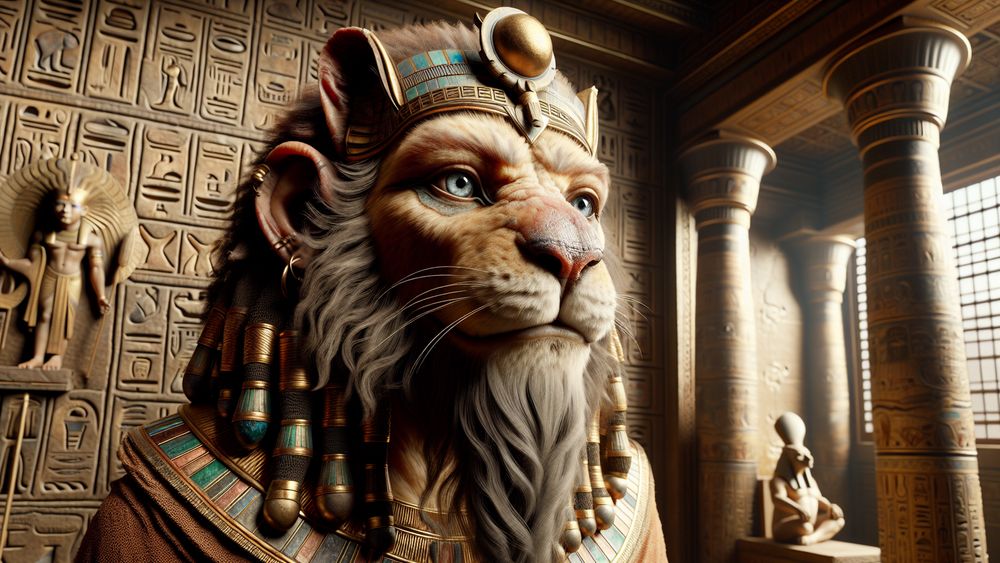
He’s got this dwarf stature and a face that leans more lion than human, which really throws you for a loop if you’re expecting the usual godly flair. But here’s where it gets interesting: Bes doesn’t hang out in the lofty realms or distant skies.
Nope, he’s all about being right there in your living room, so to speak, keeping an eye out for any bad vibes or dangers that might be heading your way. His main gig is to keep families safe and to make sure good times roll for everyone. This makes him a very personal kind of deity, which is a refreshing change from the more untouchable gods.
- When Bes sticks his tongue out, it’s his way of saying “back off” to any nasty spirits lurking around.
- He’s also a fan of a good party and often gets shown jamming on musical instruments which adds to his cool uncle vibe.
- You’ll see his face a lot on amulets and everyday items, which tells you he’s more about that home life than sitting on a throne somewhere.
- And when a baby’s on the way, Bes is the go-to guy for protection which really cements his rep as a family-first kind of god.
So, while he may play by his own rules and doesn’t quite fit the godly stereotype, Bes clearly has his own lane and absolutely owns it.
Bes, the unusual and protective deity, defies traditional godly norms by prioritizing the safety and happiness of families in a down-to-earth manner.
The Many Faces of Bes: Protector, Entertainer, and Guardian
In the life of ancient Egyptians, Bes plays a huge role. He keeps households safe. This includes fighting off bad spirits and preventing bad luck. People really look for him when they need protection which is especially true when a baby is coming or for little ones, where they believe he’s absolutely necessary. But Bes isn’t all about keeping you safe.
He’s also all about fun and tunes, which is a big part of why people like him so much. This side of him brings smiles and laughter to homes and parties, which really cements his spot as a god who’s all about the good times in day-to-day life.
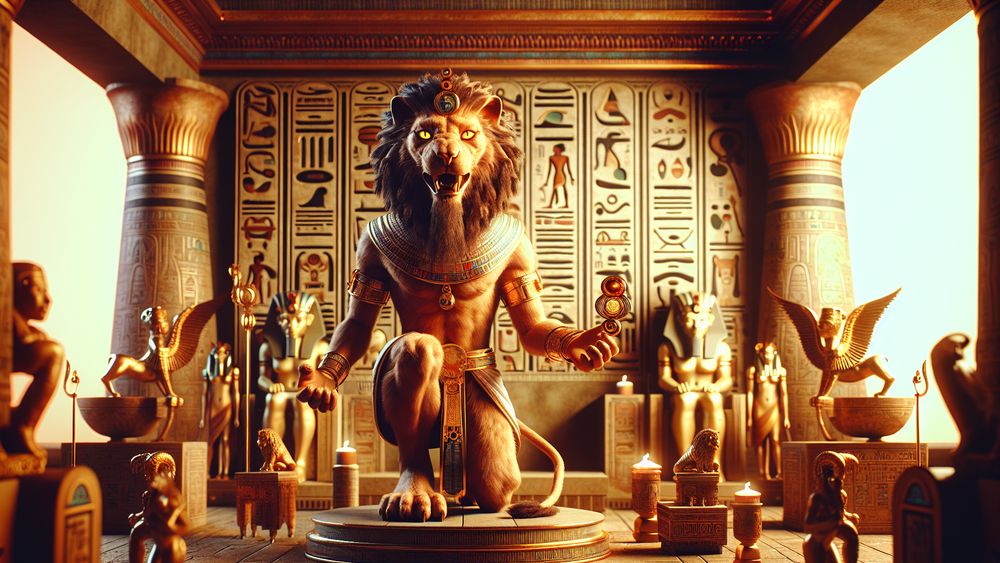
His look is unusual – short and with a face like a lion which is all about scaring away the bad and standing for his strong protective vibe. When it comes to how people show him love, it’s pretty varied.
They have statues and amulets with his face on them in their homes which are both for looks and for keeping away the bad vibes. You also see his face on furniture and personal items, which really goes to show how much they want him around and feel connected to him.
The way he looks and the ceremonies for him really shine a light on what the ancient Egyptians believe when it comes to staying safe, healthy, and happy which is super central to how they live and what they believe.
- Statues and amulets often find their place in homes for that extra shield.
- Music and dance play a key role in festivities and rituals that honor Bes.
- Childbirth and infancy specifically call for Bes’s protective edge.
- Decorative motifs featuring Bes pop up on furniture and personal belongings quite a bit.
Bes in Ancient Egyptian Culture and Religion
So, we’ve dug into who Bes is and what he does. Now, we pivot to see how ancient Egyptians wove him into their daily lives and spiritual practices.
The Worship and Veneration of Bes
People in ancient Egypt show a lot of love and respect for Bes. They do this in their homes and in public places too. At home, they set up small corners where they can talk to Bes directly. They believe he listens when they wear amulets for safety. In bigger spaces, like temples, Bes gets attention during special ceremonies.
These are mainly for keeping families safe and helping with childbirth. What people give to Bes is simple but full of meaning. They give food and flowers, thinking these offerings make him happy and keep him close. They also use small figures which play a part in their rituals and decorate their living spaces. Art and items around the house often show Bes’s image, which mixes beauty with a sense of safety.
- Small corners in homes for talking to Bes
- Wearing amulets for safety
- Giving food and flowers
- Using small figures in rituals and for decoration
- Mix beauty with a sense of safety in household items
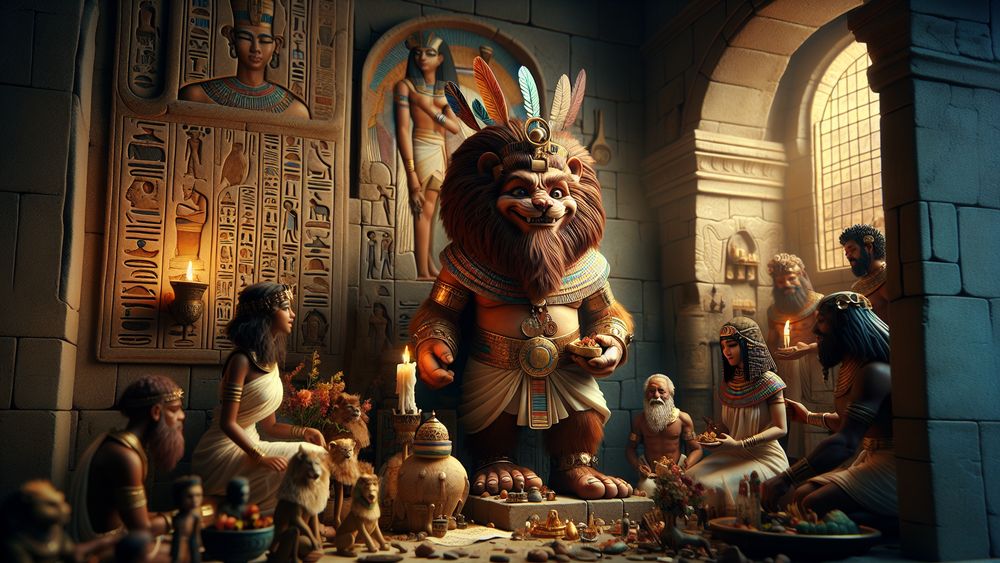
So, while they go about their day, ancient Egyptians keep Bes close. They wear amulets. They place his figure around. It’s their way of making sure he’s always there to protect and bless them. And when it comes to bigger gatherings, they come together in temples. Here, they focus on family and bringing new life safely into the world.
Through all these actions, they show a continuous and strong connection with Bes.
Bes and His Role in Family and Childbirth
In the world of ancient Egypt, Bes plays a standout role when it comes to families and when babies come into the world. Unlike other gods and goddesses who people also pray to for blessings and safety, Bes gets a special call for his protective vibes over women having babies and the very young ones.
This belief roots itself in the idea that when a baby is on the way, bad spirits might try to sneak in. Bes, looking scary, is thought to keep these spirits away, watch over the mom and baby, and help with the baby’s arrival. For expecting moms, wearing amulets and talismans with Bes’s face is a go-to move.
These items are supposed to grab onto Bes’s protective energy, which helps with making babies and keeping childbirth safe. Moms often keep these items close when their baby is coming and later put them near their babies to keep away bad spirits and sickness.
| Deity | Role in Childbirth and Family Protection | Symbolism and Tools for Protection |
|---|---|---|
| Bes | He’s all about protecting moms having babies and newborns; he keeps bad spirits at bay | Amulets and talismans with his face for making babies and safe childbirth |
| Taweret | She focuses on childbirth and fertility; she looks after women and kids | Hippo figures; amulets for safe pregnancy |
| Hathor | She’s linked to love, beauty, and tunes; she brings joy and mother vibes | Musical instruments to calm; cow amulets for looking after moms |
So, this table lays it out clearly. While Taweret and Hathor have their own lanes focusing on fertility and taking care of moms, Bes covers more ground. He’s all about keeping the whole house safe but really shines when it’s about the risky times of having a baby and when babies are very small.
Bes is essential for protecting mothers and newborns from bad spirits during childbirth and early stages of life, and using amulets and talismans with his face is a common practice for this purpose.
The Iconography and Symbolism of Bes
So, after we’ve talked about his role with families and when babies come into the world, we’re shifting gears. Now, we’re heading into how Bes looks and what those looks mean.
Decoding the Symbols: Bes’s Appearance and Attributes
When we look at how artists in ancient Egypt chose to show Bes, we see him quite differently from other gods. He’s short, which is unusual because most gods aren’t. His face looks like a lion’s and he sticks out his tongue. These details aren’t random but full of meaning.
Being short brings Bes closer to the ground, which may suggest he’s more reachable, especially for matters of the home and keeping families safe. His lion-like face and that bold gesture of sticking out his tongue? They’re all about strength and scaring away bad vibes and harmful spirits.
So, when you see Bes looking somewhat funny with that tongue out, remember, he’s actually working hard to keep the bad away and bring in the good. This way of portraying him ties directly back to his job as a guardian and a source of comfort for people, which clearly mattered a lot to those in ancient Egypt.
They saw him as a key figure for their well-being and peace at home.
The Legacy of Bes Through Time
So, we’ve dived into how people in the past and today see Bes in art and cultural expressions. Now, we shift gears. We look at how his impact and importance have shiftedly morphantly across many years.
From Ancient Times to Modern Day: The Evolution of Bes’s Worship
The way people have shown their respect and admiration for Bes has changed a lot since the very old days in Egypt. Back then, everyone knew Bes as the go-to god for keeping families and especially little ones safe. They put his image everywhere, from the walls of their homes to tiny charms they carried around.
But as time marched on and new religions took over, the old ways of honoring Bes started to fade away. Yet, here we are, seeing a comeback of interest in this ancient figure. Nowadays, folks are drawing him back into the spotlight, but for somewhat different reasons.
They see him as a symbol for safeguard and luck in a modern twist on spirituality and culture that likes to pick and choose from the past.
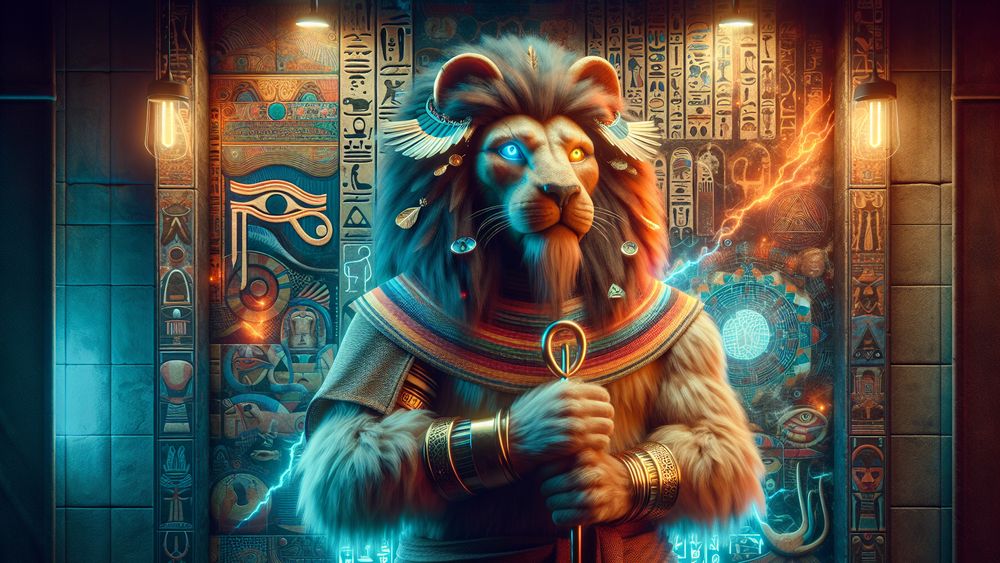
This shift from being a household name in every Egyptian home to becoming a special interest for those looking for something different in today’s world tells us that the stories and beliefs about gods like Bes can find new life in unexpected ways.
The Influence of Bes on Later Religions and Mythologies
When we look at Bes, an ancient Egyptian deity, and his journey through time, it’s clear he leaves a mark on later religious beliefs, especially within Christian and Islamic traditions. These traditions, which came after, show figures somewhat like Bes but with twists. In these newer religious landscapes, there are beings that stand guard against dark spirits and bad luck, which sounds a lot like what Bes does.
Yet, while folks in ancient Egypt saw Bes as a good guy, bringing safety and smiles, the later versions of similar beings sometimes get a bad rap, seen more as troublemakers or scary entities. This shift is interesting because it flips the script on how we understand protective spirits.
Moreover, when we compare Bes to similar beings across different cultures and religions, we notice that many groups of people have their own version of a guardian figure. But, and this is key, the mix of Bes being small but mighty, with a lion’s face and being a family’s guardian, that’s special to where he comes from. This tells us a lot about the culture and beliefs that gave birth to Bes.
So, while his influence clearly reaches into other religious realms, the heart of who Bes is – that stays unique to ancient Egypt.
Pantheon of All the Egyptian Mythology Gods
The Egyptian mythology indeed is a wide and fascinating network of gods and goddesses. Each one carries their own distinct roles and narratives. From the very recognized ones like Ra, who commands the sun, and Isis, who wields magic and nurturance, to those less spotlight-grabbed entities such as Bes, indeed, this pantheon lays down the foundation for the ancient Egyptian belief and cultural system.
For a deep-dive into these divine figures, you should check out this list of all the Egyptian gods.
FAQs
1. What made Bes different from other Egyptian gods?
His unusual look and specific job set Bes apart from other Egyptian gods. He’s short, which is unusual. He focuses on keeping families and homes safe. This is his main thing.
2. How did Bes protect families and children?
By ward off evil spirits and providings blessings for health and happiness, Bes safeguards families and children.
3. Can you find representations of Bes in modern culture?
Yes, indeed, in today’s art and literature, you often stumble upon Bes. His figure and traits, artists and writers sometimes pull from or give a new twist. They keep it light and easy for readers and viewers to catch on. They sprinkle his essence here and there. You see, they make sure Bes lives on. They do this while teaching us a bit about him.
4. How has the perception of Bes changed over time?
Over the years, the way people see Bes shifts. Initially, in ancient periods, many looked up to him as a key figure for safeguard and luck within the household. Now, in our times, he grabs attention mainly for his historical and mythological significance. This change, indeed, tells us a lot. It moves from a very hands-on role in daily life to being a subject that sparks curiosity and learning.

